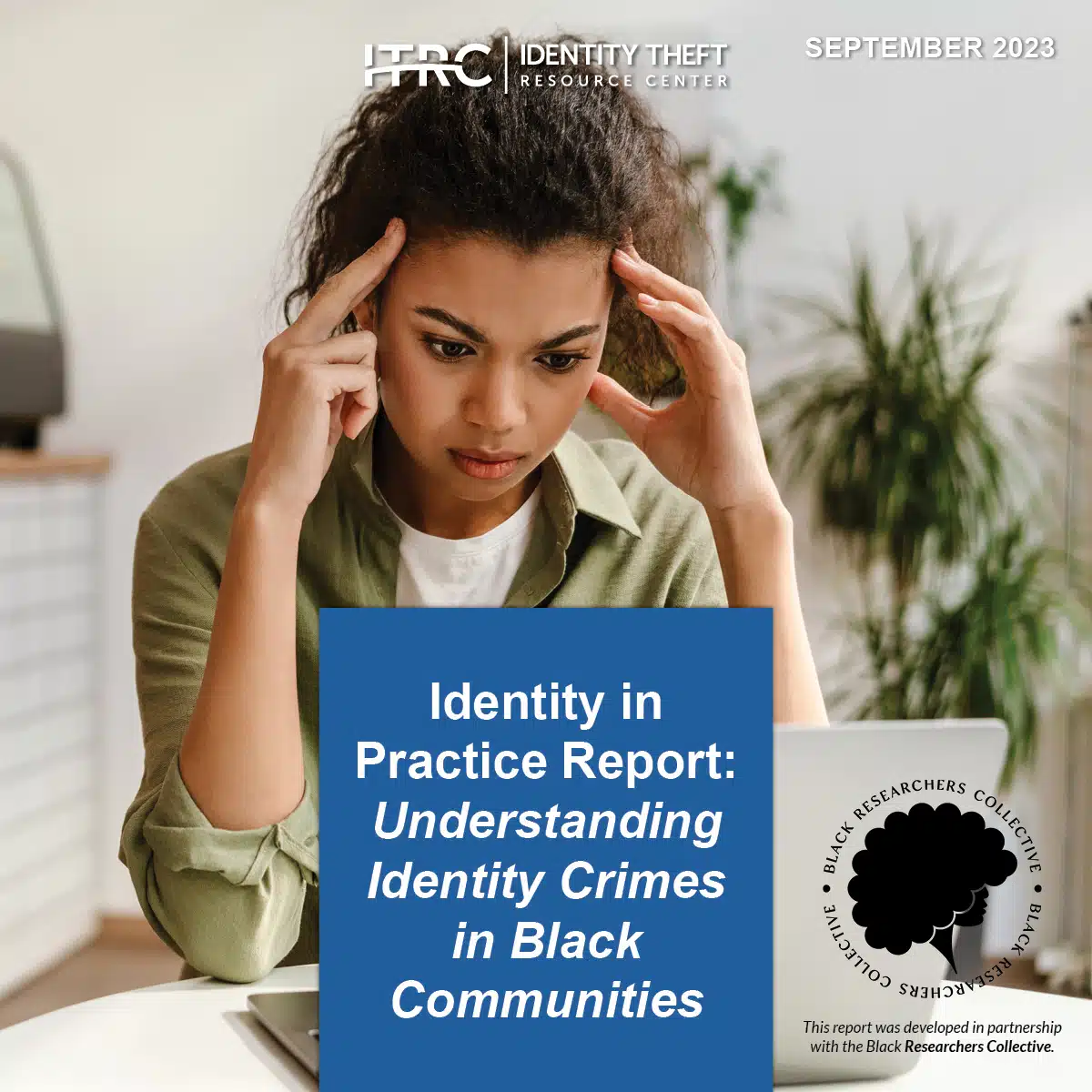Identity Theft Resource Center Releases Report on Identity Crime Victimization in Black Communities Ahead of Cybersecurity Awareness Month 2023
According to the Identity in Practice Report, 56 percent of participants were victimized by strangers and 40 percent by someone they know

SAN DIEGO, September 26, 2023 /3BL/ - Today, the Identity Theft Resource Center® (ITRC), a nationally recognized nonprofit organization established to support victims of identity crime, in partnership with the Chicago-based Black Researchers Collective (BRC), released its Identity in Practice Report, which seeks to understand and examine identity crime victimization across Black communities in the United States. The project is supported by LifeLock (a part of Gen™), Synchrony and the Wells Fargo Foundation. This comes ahead of Cybersecurity Awareness Month 2023, of which the ITRC is a supporter of the annual initiative.
As part of a two-year research project, the BRC collected responses from participants who identified as Black or African American. (See the “About the Research” section below for more information.) The BRC conducted quantitative and qualitative research, including focus groups in Philadelphia, Atlanta and Chicago, in cooperation with local community groups.
Among the findings:
- Most participants were victimized by strangers (56 percent), but a large minority (40 percent) said they were victimized by someone they knew, with at least 13 percent being family members.
- Revictimization was also prevalent in the three cities (83 percent in Atlanta and Chicago each; 86 percent in Philadelphia) where qualitative focus groups were conducted. For those who experienced financial loss, most lost at least $500.
- Fifty-three (53) percent of participants across the focus groups expressed emotional and psychological impacts after becoming a victim, as well as challenges accessing financial accounts, securing tax returns, obtaining identity PINs and dealing with penalties for reporting identity fraud.
DOWNLOAD THE IDENTITY IN PRACTICE REPORT
“This research is an important step in gathering more data around identity theft victimization in Black communities,” said Eva Velasquez, President and CEO of the Identity Theft Resource Center. “In 2018, when the ITRC identified a dramatic increase in the number of victims from Black communities contacting the Center for assistance and searched for existing research that might indicate why, there was none. That led to this multi-year, multi-phase study.
The findings in this report show that identity theft is a growing concern and that Black communities face distinct challenges. Action must be taken to reduce victimization, particularly repeat victimization, but it is also clear that Black communities need more support to adequately address the issues surfaced here.
We are eager for the next phase of this initiative so we can begin developing and testing specific identity crime materials and advice that will lead to meaningful change.”
Other findings in the report include the following:
- Twenty-five (25) percent of identity theft cases remained unresolved, revealing the prevalence of identity theft incidents lacking closure. Only 11 percent of participants reported successfully resolving their issue with minimum barriers.
- Of those who were a victim of an identity crime in the last five years, 25 percent were victimized during COVID-19.
Recommendations for the next steps highlighted in the research include:
- The need for comprehensive financial support and recovery mechanisms
- Educational awareness, like government workshops focused on credit and the integration of identity theft awareness into the K-12 curriculum
- Legal and regulatory measures such as higher penalties for identity crimes and identity verification for tax filing
- Support and empowerment, emphasizing spaces to share experiences and empathy from customer service representatives
This three-year initiative looks to develop culturally aware identity services in Black communities, including specific identity education and protection programs. The initiative is similar to a program previously funded by the U.S. Department of Justice – Office of Victims of Crime that focused on developing identity protection programs for the blind/low vision and deaf/hard of hearing communities.
The ITRC is proud to release this report before Cybersecurity Awareness Month 2023. Founded in 2004 and held each October, Cybersecurity Awareness Month is the world’s foremost initiative aimed at promoting cybersecurity awareness and best practices.
“The ITRC has been a supporter of Cybersecurity Awareness Month from the beginning,” Velasquez said. “We hope that releasing this report prior to Cybersecurity Awareness Month will help bring recognition to the lack of assistance programs around identity theft victimization that take into consideration the unique issues required to be effective in assisting Black communities.”
For Cybersecurity Awareness Month 2023, the ITRC will also release its Q3 2023 Data Breach Analysis, which looks at the data breach findings from the third quarter of the year, and 2023 Business Impact Report, which analyzes the impacts of identity crimes and cyberattacks on small businesses.
Anyone who believes they are the victim of an identity crime can contact the ITRC toll-free by phone (888.400.5530) or live chat on the company website www.idtheftcenter.org.
About the Research
In the spring of 2023, the Black Researchers Collective (BRC) conducted six focus groups – two in each city – with people who both self-identified as Black and reported being a victim of an identity crime across three major cities in the Midwest, East Coast and the South. Across the focus groups, BRC met with a total of 55 participants, the average age of whom was 44 years old. Although the age profiles were fairly balanced across all three cities, most focus group participants (82 percent) were under the age of 55. The majority of participants who participated in the focus groups were cisgender women (71 percent), while 29 percent of participants were cisgender men. Most of the focus group participants (80 percent) had household incomes under $75,000, and over half (56 percent) made under $50,000 a year despite over half of the sample also being college-educated with degrees (53 percent). The majority of participants (71 percent) also experienced what BRC defined as compounding factors, meaning that in addition to being a victim of an identity crime, they were also experiencing one or more of the following factors while also experiencing victimization: recently justice-involved, recently homeless, recently housing insecure (moving more than two or more times in a calendar year; spend more than 35 percent of income on housing), or had at least one minor (dependent) in their household they care for.
About the Identity Theft Resource Center
Founded in 1999, the Identity Theft Resource Center® (ITRC) is a national nonprofit organization established to empower and guide consumers, victims, business and government to minimize risk and mitigate the impact of identity compromise and crime. Through public and private support, the ITRC provides no-cost victim assistance and consumer education through its website live chat idtheftcenter.org and toll-free phone number 888.400.5530. The ITRC also equips consumers and businesses with information about recent data breaches through its data breach tracking tool, notified. The ITRC offers help to specific populations, including the deaf/hard of hearing and blind/low vision communities.
Media Contact
Identity Theft Resource Center
Alex Achten
Director of Communications & Media Relations
888.400.5530 Ext. 3611
media@idtheftcenter.org

